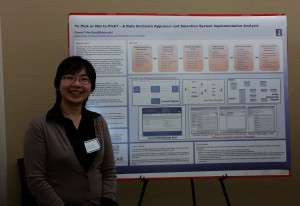As scientific projects grow more collaborative, data citation and data attribution has emerged as challenging issue. Sophie Hou will be presenting her poster on this topic and leading a discussion on how scientists might look to the movies to improve data attribution and acknowledgements.
Abstract: As scientific data volumes, format types, and sources increase rapidly with the invention and improvement of scientific capabilities, the resulting datasets are becoming more complex to manage as well. One of the significant management challenges is pulling apart the individual contributions of specific people and organizations within large, complex projects. This is important for two aspects: 1) assigning responsibility and accountability for scientific work, and 2) giving professional credit to individuals (e.g. hiring, promotion, and tenure) who work within such large projects.
This presentation will provide an overview for the concept of data citation, its current practices, and the strengths and weaknesses of the current data citation methods when applied to climate model dataset. Using the NCAR Global Climate Four-Dimensional Data Assimilation (CFDDA) Hourly 40km Reanalysis as a case study, the presentation will also demonstrate the creation and the result of a detailed data attribution. Analogous to acknowledging the different roles and responsibilities shown in movie credits, the methodology developed in the study could be used in general to identify and map out the relationships among the organizations and individuals who had contributed to a dataset. Finally, discussion questions will be presented in order to consider how this framework could be applied to create data attribution for other dataset types beyond climate models datasets.

